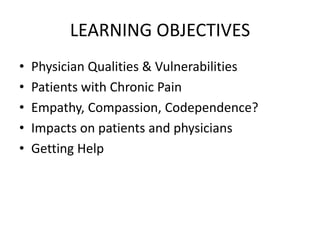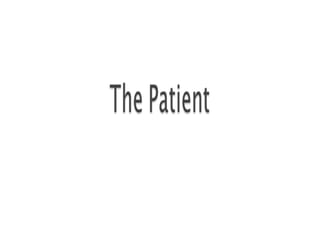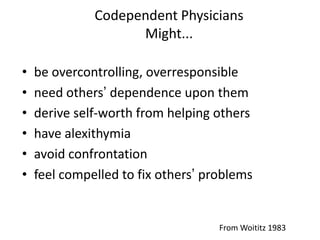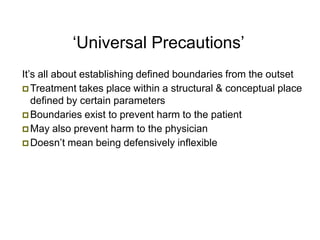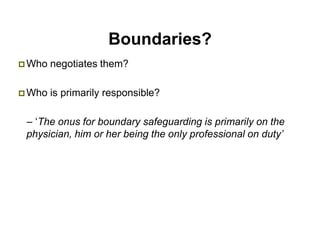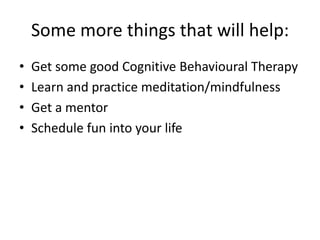Plenary 5 farnan pain and co-dependency
- 1. Pain & Codependency in Physicians & Patients Dr. Paul Farnan Foundation Medical Excellence Vancouver March 2014
- 2. Disclosure Disclosure I have no financial interests or affiliation with any pharmaceutical industry or manufacturer to disclose Disclaimer Views expressed are my own Acknowledgements Dr. Ray Baker, Dr. Mick Orescovich
- 3. LEARNING OBJECTIVES • Physician Qualities & Vulnerabilities • Patients with Chronic Pain • Empathy, Compassion, Codependence? • Impacts on patients and physicians • Getting Help
- 4. Physicians
- 6. What is a ‘Good’ patient? ◦ Severity of symptoms correlates with an overtly diagnosable disorder ◦ Emotionally intact ◦ Compliant and doesn’t challenge ◦ Grateful i.e. – a good patient is a good fit with the Acute medical model Oreskovich
- 7. is psychologically vulnerable and subject to strong emotions It is not surprising that physicians respond to these patients with emotions of their own. Patient with Complex Chronic Pain..
- 8. ‘If I work hard(er), I will be loved’ Roots of Physician Stress Explored Lynne Lamberg JAMA 1999;282:13-14
- 9. • “To write prescriptions is easy, but to come to an understanding with people is hard” • - Franz Kafka
- 10. Blame the drug.... or the patient? ‘Adverse selection’: the pairing of high risk patients with high risk opioid regimens.... Sullivan ‘Opioid Epidemic’
- 11. Why does Adverse Selection occur? Physicians want to help patients in pain but have few tools other than Rx pad Patients with Mental Health & SUDs and multiple pain problems are more distressed (pain & psychological symptoms) and more persistent in demanding opioid initiation and dose increases Physicians use opioid prescriptions as a 'ticket out of the exam room' Sullivan
- 12. Dysfunctional/alcoholic family of origin Emotionally traumatized Past episode of SUD Stimulus augmenters - deficit in hedonic tone Lack effective coping skills Dependent traits Problems with relationships Savage 1991
- 13. Empathy & Compassion Research • Subjective Experience • Empirical findings/Neuroscientific data
- 14. Codependence A psychological syndrome seen in people affected by someone’s addictive/abusive behaviour Characterized by a need to meet the needs of, to fix or to control others.
- 15. Codependent Physicians Might... • be overcontrolling, overresponsible • need others’ dependence upon them • derive self-worth from helping others • have alexithymia • avoid confrontation • feel compelled to fix others’ problems From Woititz 1983
- 16. Codependent Physicians Might also... • feel anger when their help is ineffective • have trouble saying no • feel safest while giving • attract, be attracted to needy people • neglect own needs, feel stressed • have difficulty accepting help From Woititz 1983
- 17. Enabling Q: What motivates the addict to recover? A: Awareness of the consequences of their behaviour What motivates your patient who has a complex disorder (with a behavioural component) to change their unhealthy behaviour?
- 18. If you find that you have a constant need to help others….. Notice how you must keep them helpless R. Anthony ‘86
- 19. Enabling • Failing to confront with feedback • Writing sick notes (stress leave) • Prescribing to treat emotional consequences • Failing to report (WCB, Motor vehicles) • Taking excessive responsibility • Not enforcing contracts • Continuing to supply drugs when they are doing more harm than good
- 20. Physician at Risk? Strong relationship with patient Undervalued Undersupported Burnt out Life Crises Transitions
- 21. Physician at Risk Illness of the provider Unresolved rescue fantasies Loneliness and impulse to confide The ‘special patient’ Inability to set limits Overconfidence Denial about possibility of boundary issues
- 22. ‘Universal Precautions’ It’s all about establishing defined boundaries from the outset Treatment takes place within a structural & conceptual place defined by certain parameters Boundaries exist to prevent harm to the patient May also prevent harm to the physician Doesn’t mean being defensively inflexible
- 23. Boundaries? Who negotiates them? Who is primarily responsible? – ‘The onus for boundary safeguarding is primarily on the physician, him or her being the only professional on duty’
- 24. Prevention Dependence(Codependence)? Independence(Contradependence)? Healthy Interdependence ‘Interpersonal relationships are the number one predictor of well-being’ Tal Ben-Shahar
- 25. Summary: • codependence: a syndrome • interferes with boundaries, relationships • causes enabling rather than empowerment • sets up people for somatization, burnout • if identified is remediable • with help, we make the best docs
- 26. • Read some literature: eg. Woititz, Cermak, Beattie • Go to some meetings: Al-Anon, CODA, ACOA • Study and practice health boundary setting (Boundaries, Cloud & Townsend) How to Stop Acting and Feeling Codependent
- 27. • Get some good Cognitive Behavioural Therapy • Learn and practice meditation/mindfulness • Get a mentor • Schedule fun into your life Some more things that will help:


